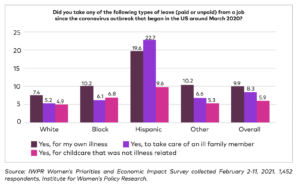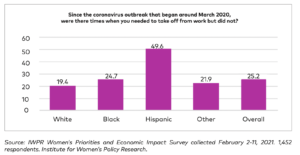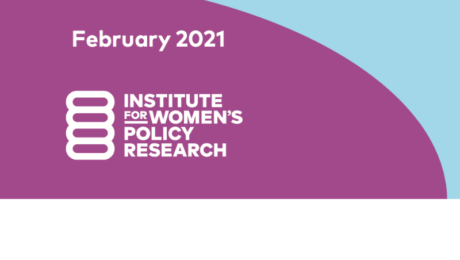Women and the Pandemic in the U.S.
Institute for Women’s Policy Research released a report in February 2021”IWPR Women’s Priorities and Economic Impact Survey” outlining a recent poll of 1452 women in the U.S. The findings are backdropped by the experience of women throughout the pandemic and resulting economic turndown, in which 2.35 million women have left the workforce since February 2020.
Some of the key findings from this survey are:
- 1 in 4 women report that they are worse off financially than one year ago
- Nearly half of all women are worried about the financial situation of their families
- 1 in 4 women report having needed to take time work off but did not do so
- 40% of women reported care demands stopped them from working or forced them to reduce hours
- 69% of women support paid sick time to have a child, recover from a serious health condition, or care for a family member
- 20% of women with children want the Biden administration to address childcare and education in the first 100 days

In terms of women experiencing reduced paid work as a result care demands, this has also been pointed to within recent working papers put out by the
The impact of care demands on women’s paid work is explored in a number of Care Work and the Economy Working Paper Series. For instance in two recent papers, “Gender Wage Equality and Investments in Care: Modeling Equity and Production” and “Parental Caregiving and Household Dynamics”.
Education and childcare were listed among the top priorities for the Biden administration to address within the first 100 days among survey participants. This is largely because women’s ability to reenter the workforce largely depends upon safe reopening of schools and childcare facilities.
Latinas have been hit particularly hard according to this survey, reporting the highest levels of taking leave from jobs in order to provide care. However, across all ethnicities, 69 percent of women expressed strong support for paid sick leave and the ability to take time away from work to provide care or recover from illness.

The Unites States remains the only high-income country in in the world that fails to provide guaranteed paid sick or family leave for workers. The Family Medical Leave Act, which provides unpaid job protection, and only for about 56 percent of workers. The Families First Coronavirus Relief Act has provided access to paid leave as a result of the pandemic but falls short in the fact that more than 100 million workers are excluded from this because they are caregivers.
In order to address the many issues identified throughout this survey, there is strong need for targeted programs and policy solutions that will aid a gender equitable recovery. This recovery should not only address immediate short term needs but include long term strategies that will create more resilient systems that recognize the contributions of women to the workforce, society and family structure.
IWRP specific recommendations for the short term are:
- Continuing economic impact payments
- Expanding access to affordable healthcare
- Providing paid sick and medical leave
- Raising the federal minimum wage
- Building a new childcare infrastructure
Equitable economic recovery necessitates a national care system that meets the needs of all families, raises wages and provides quality childcare, treating it as a public good instead of a private obligation.
This blog was authored by Jenn Brown, CWE-GAM Communications Assistant
- Published in Child Care, Gender Inequalities, Policy, Policy Briefs & Reports, U.S.

